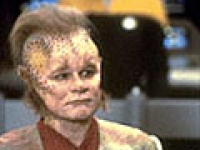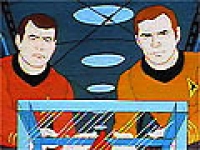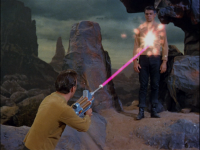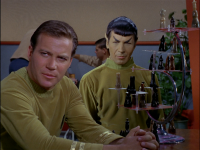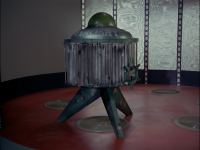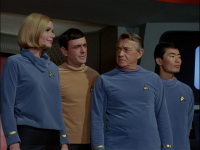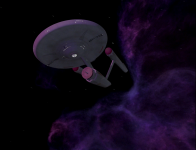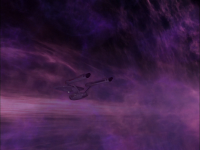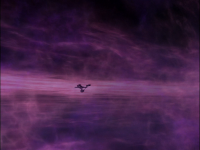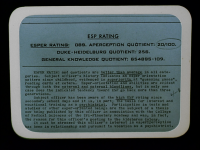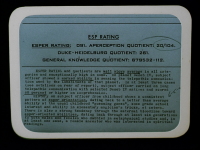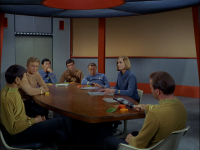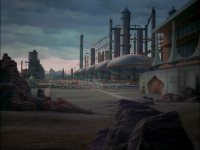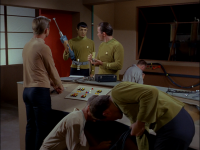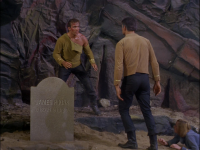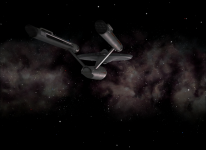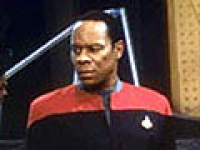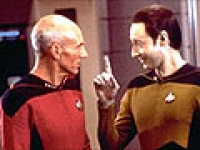Star Trek: Newest — 1x03 — Temporal Edict
Synopsis
A new work protocol eliminating "buffer time" has the Lower Decks crew running ragged as they try to keep up with their tightened schedules. Ensign Mariner and Commander Ransom's mutual lack of respect comes to a head during an away mission.
Remarkable scenes
- Tendi: "Wait, don't we have to report that we're done so we can get a new task?" Mariner: "Don't sweat it baby girl, like many things, commanders have no idea how long it takes to balance a phase variance." Rutherford: "You never admit the actual amount of time it takes to finish a job. If you did, your days would be packed." Tendi: "Isn't that lying?" Rutherford: "No. It's creative estimating. When you get an assignment, you exaggerate how long it's gonna take, then you're a hero when it's done early!"
- Freeman demanding that Boimler explain buffer time.
- Ransom: "I'm picking up an increase in atmospheric hydromounds." Mariner: "Yeah, they're called clouds, man."
- Mariner: "Hey guy, is this what you wanted to do with your life? Just capture people? Is that what you dreamt of when you were a little whatever you are? Are you fulfilled by that?" Guard: "Yes." Mariner: "Wow. All right, uh, well, do you know what? That means you're lame. You're a loser."
- Ransom injuring Mariner so she can't fight in the duel.
- T'Ana: "Want me to clean up those disgusting scars?" Mariner: "No way, no these are my trophies!" T'Ana: "Congratulations, you look like a fucking scratching post."
Review
This episode is both wonderful comedy and a fantastic commentary on workism: the cult of hyperproductivity that has afflicted modern society. Captain Freeman becomes obsessed with squeezing as much productivity out of her crew as possible, so she imposes the equivalent of an excessively rigid implementation of the Agile/Scrum-style management fad on the crew, complete with down-to-the-second time tracking like something out of bad Silicon Valley companies or the dystopian Amazon fulfillment centers.
This parody of modern surveillance capitalism might seem especially out of place in the socialist utopia of the Federation, but that's precisely what makes it such inspired comedy. Even in the real world, it isn't just low income people exploited by abusive employers who are worked to the bone. In fact some of the most strict adherents to the cult of hyperproductivity are the more affluent among us who put in excessive numbers of hours working out of a desire to appear as productive as possible since the image of being among the idle rich has long since become passé. As such, it makes sense that people in the Federation would struggle with this impulse too.
The story even peppers the plot with other delightful details that reflect modern commentary on micromanagement fads, such as Tendi's naive discomfort with juking estimates to get more break time, Boimler's bootlicker stance, and Mariner immediately blaming delta shift for the higher workload rather than punching up towards the real villain of management. Indeed, this is among the most class-conscious episodes of Star Trek ever written and the result is exactly what we see in the real world when middle managers mire us in micromanagement, multitasking, and continual interruptions. People get exhausted and the quality of their work declines. Crucially, the crew commits a serious and easily-preventable diplomatic error because they had been so overworked.
The conflict with the aliens could've been written better though. It is stated that they're new members of the Federation, but they also spend much of the episode trying to kill members of Starfleet. It's hard to imagine the Federation would allow a member world to have laws that punish diplomatic offenses with executions. Vindor even suggests reforming their legal system towards something less crazy at the end of the episode and his suggestion is quickly quashed in a glib joke.
The interplay between Mariner and Ransom worked much better, though. The begrudging admiration they develop for each other by the end of the episode was great character development for both of them. It is remarkable that Ransom's lack of scarring was neither because he fails to take risks, nor because he had the scars removed as it may have seemed at first. He is apparently just that good in a combat situation, much to Mariner's surprise and at times girlish glee. Last but not least, what a tease opening the episode with a captain's log outlining a mission to Cardassia Prime only to have it yanked away seconds later. It sure would be nice to see how that unfortunate planet is doing five years after the Dominion War. All things considered though, this is the best episode of the series so far.
Star Trek: Newest — 1x03 — The End is the Beginning
Synopsis
Completely unaware of her special nature, Soji continues her work and captures the attention of the Borg cube research project's executive director. After rehashing past events with a reluctant Raffi, Picard seeks others willing to join his search for Bruce Maddox, including pilot and former Starfleet officer Cristóbal Rios.
Remarkable scenes
- The flashback to the aftermath of Picard resigning from Starfleet 14 years ago in 2385.
- The revelation that Hugh works aboard the Romulan Borg cube.
- Rios to his hologram: "Spare me the juvenile Sunday school morality." His hologram: "And spare me the angsty teenage moral relativism."
- The Romulan attack on Chateau Picard.
- Raffi: "You're just gonna let Agnes here hitch a ride on your top secret mission?"
- Picard: "Engage."
Review
Another solid, if slow episode. In some regards the slowness is appreciated. It's nice that they took their time furnishing Picard with a ship, particularly after the previous episode establishing clearly that Picard can't just order up a spiffy new ship on demand. Instead he has to work connections to find shady people willing to go out on a limb for him. Another nice touch was the scene when Laris remarked that chateau life wasn't right for Picard and that his real home was amongst the stars. This was a touching echo of Picard's exchanges with his late family in TNG: Family.
On the topic of chateau life, it's fascinating to see Raffi express resentment towards Picard not just because he was indirectly responsible for getting her fired from Starfleet, but also because his retirement was considerably more glamorous compared to her comparative squalor. The continued existence of wealth inequality to some degree in the Federation might seem to run counter to the utopian vision of Star Trek, but it makes a great deal of sense. We can safely assume Raffi doesn't live in poverty as we know it today. She like any other Federation citizen no doubt has free, universal access to food, shelter, healthcare, and other basic needs. But some things even in the utopian Federation would undoubtedly still be scarce. One cannot simply walk up to the replicator and say, "Chateau, vineyard, France," or "Ship, warp capable, unregistered." For Picard to be able to live on such a vast estate, he clearly had to have some wealth, or at least significantly more social capital of some kind than Raffi did. The episode makes other references to the continued existence of money as well too, such as in reference to the cost of Rios' services.
Speaking of Rios, it is curious how his "unregistered" starship can just hang out in Earth orbit without setting off any alarms. An unlicensed ship could be a powerful weapon in the wrong hands. The warp core could be jury-rigged into an antimatter bomb, and an antimatter explosion on Earth could kill tens or perhaps even hundreds of millions of people. It has always been strongly implied that the Federation heavily regulates who gets access to starships for this reason, so it isn't entirely clear why Rios can just fly around with an unregistered starship like someone joyriding in a Ferrari without a driver's license without anyone seeming to be remotely concerned about it.
It is even more curious that his ship is outfitted with a flock of emergency holograms. It seems holograms are either inexplicably not banned as androids were, or the holograms on Rios' ship are illegal. The lingering still unresolved questions about the status of holograms relative to androids are starting to get pretty conspicuous and annoying. Though one detail pertaining to continuity that is quite appreciated was the little throwaway line from Laris about Romulans with forehead ridges being "northerners." This provides us with an in-universe explanation for why some Romulans have forehead ridges and some don't: it is has to do with ethnic groups among Romulans. This inconsistency was long considered by Star Trek fans to be a similar if less severe problem akin to the Klingon forehead problem created by the transition from TOS to the original series films. The Klingon forehead problem was fixed in Ent: Affliction and Ent: Divergence. Now the Romulan forehead problem is fixed here. A fantastic example of this show playing very nicely in the canon sandbox.
Another great example of this show leveraging canon was bringing back the character of Hugh, last seen in TNG: Descent, Part II in September of 1993, more than 26 years before this episode! We don't know too much about what he's been up to since taking over the rebel Borg faction left behind by Lore, but we learn that he's now the executive director of the Reclamation Project charged with "reclaiming" the Borg drones severed from the collective, now termed xBs. It is curious that Ramdha and a ship full of her fellow Romulans were the last people assimilated by this cube before it suffered a "submatrix collapse." This sounds strikingly similar to what might have happened if the weapon that the Enterprise crew devised to attack the Borg using Hugh in TNG: I, Borg had actually been deployed. Could the Romulans have stolen this virus from the Federation? Could they have invented a similar one of their own? Hopefully we'll find out soon.
Star Trek: Newest — 1x03 — Context Is for Kings
Synopsis
Burnham finds herself aboard the U.S.S. Discovery where she quickly realizes things are not as they seem, including the mysterious Captain Gabriel Lorca.
Remarkable scenes
- Burnham's convenient rescue by the Discovery.
- Captain Lorca has a pet tribble, hah.
- Lorca to Burnham regarding his fortune cookies: "It was a family business a century ago. That was before the future came and hunger, need, and want disappeared. Of course they're making a comeback now, thanks to you!"
- Saru: "I believe you feel regret. But in my mind, you're dangerous. Captain Lorca is a man who does not fear the things normal people fear. But I do. And you are someone to fear, Michael Burnham."
- Lorca: "Number One, you served with Burnham aboard the Shenzhou. What is your assessment of her abilities?" Saru: "Her mutiny aside, she is the smartest Starfleet officer I have ever known." Lorca, turning to Stamets: "Huh. And he knows you!"
- Saru: "You were always a good officer. Until you weren't."
- The Discovery destroying the Glenn.
Review
The Discovery finally makes its debut in this episode in a remarkably shady fashion. The apparently highly corrupt Captain Lorca orchestrated a prisoner shuttle emergency to capture Burnham and manipulate her into joining his crew. Did he end up killing that shuttle pilot that came loose from the tether in the process? It's best not to dwell on such minutia... the episode certainly doesn't. What's important is Captain RansomLorca of the Federation starship EquinoxDiscovery has found a way to travel through space really really fast by experimenting on the protomolecule from The Expansesome mysterious alien stuff we've never seen before.
We have seen this basic story outline many times though. The Expanse's protomolecule notwithstanding, we've seen instantaneous travel technology on Star Trek many times. Beyond Voy: Equinox, there are a handful of other examples, but the one this episode most closely resembles is the Iconian gateways featured on TNG: Contagion and DS9: To the Death. The presentation of rotating landscapes is so similar to those portrayals in fact, it's legitimate to wonder if Iconian technology was in fact based on the same stuff that Lorca has discovered. We'll see.
What is clear though is this research project is definitely not going anywhere. Since this is a prequel, we know that nothing based on this technology ever gets developed and mainstreamed by anybody, so it's all going to go horribly wrong at some point, making it kind of hard to care about this research project at all.
In addition to that though, the coarse, sneering cynicism oozed by just about every character except for Saru also makes it difficult to sympathize with any of the people engaged in this research. It's hard to imagine why Saru, a person of clearly upstanding and incorruptible moral character, would choose to work in this den of snakes. It's sort of fuzzily implied that Saru understands the necessity of the shady secret research they're engaging in, but so far the narrative just isn't selling it. The title of the episode "Context Is for Kings" hints at what they were going for though. That and several other emotional beats in the episode are evocative of this moving exchange from BSG: Pegasus:
Adama: "Wait for all the facts. Context matters." Tigh: "Context? That woman shot an officer right in front of the crew." Adama: "We shot down an entire civilian transport with over a thousand people on board. Says so right there." Tigh: "That was completely different. And we don't know there were people on that ship." Adama: "Which is why I hope the admiral reads the complete log and understands the context."
It seems this episode is going for a similar vibe: that Lorca's actions, morally questionable as they may be, are justifiable to some degree given the context they're operating from. But that's hard to see at this moment. From what we've seen so far, Captain Ransom of the Equinox was easier to sympathize with than the borderline megalomaniacal Captain Lorca. Ransom had real, desperate reasons to act with such cruelty. Lorca seems more like a mad scientist gone batty with power.
Perhaps the worst parts of the episode though were the obligatory space monster horror scenes. Anything that resembles Ent: Impulse is definitely not going to win a lot of points. Between that and the murky character writing, this episode is a pretty significant step down in quality from the pilot. Notably though, Captain Lorca's character has some potential. The comparisons to Captain Ransom from Voyager have the potential to be quite flattering: Ransom was awesome. With a bit more careful writing, Lorca could develop into a very interesting character. They've also got some potential to connect him to Section 31 in some interesting ways here too, which could help with containing some of the continuity problems that are starting to pile up.
Star Trek: Newest — 1x03 — Fight or Flight
Synopsis
The crew comes across an abandoned ship of dead aliens.
Remarkable scenes
- Archer: "Come on, Travis. We've got to find Mr. Reed something to blow up!"
- Phlox sharing his observations of humanity with Trip.
- Hoshi freaking out about the alien corpses.
- Archer second guessing himself and deciding to turn back and go back to that ship to investigate.
- The alien ship thoroughly kicking Enterprise's ass.
- Hoshi defeating the language barrier.
Review
This episode outlines Earth's first contact with the Axanar, a species we've heard of before in TOS (mentioned in TOS: Court Martial and in TOS: Whom Gods Destroy). I'm glad the writers didn't repeat the mistake here that they made with the Suliban and the Denobulans. Granted, nobody knows who was in that alien ship that almost tore Enterprise a new rear end, but I don't think that it's very important. Personally I think this episode belongs to Reed and especially to Hoshi. Reed was concerned that Enterprise would do poorly in a fight due to its primitive and improperly configured weaponry, and he was right. Hoshi was concerned that she'd have no grace under pressure, and she was right too... for a while anyway. It's kind of annoying that she doubted her ability right up to the point when Enterprise was about to be destroyed before finally showing some courage. But it was easily realistic and it was nice to watch her character evolve from a scared little girl to a confident young women in the course of a single episode. As a more general analysis, this episode does well to further elucidate the fact that Earth is hardly prepared for exploration. This mission would have hardly been worth a full hour on any other Star Trek show, so the writers are taking full advantage of Enterprise's weaknesses, for they are a strength in terms of writing for a prequel.
Star Trek: Newest — 1x03 — Parallax
Synopsis
Tensions rise between the merged Starfleet and Maquis crews.
Remarkable scenes
- The first scene, with Carey bemoaning about Torres having broken his nose.
- Torres throwing something at Chakotay as he enters.
- Chakotay and Torres arguing.
- Janeway's reaction to Chakotay suggesting Torres as the new Chief Engineer.
- Neelix referring to the doctor as an "electronic man", enunciating as he speaks it.
- The captain designating Tom a field medic, much to his displeasure.
- Chakotay arguing with Janeway about the Maquis.
- The doctor bemoaning about his new job.
- Kes' first scene with the doctor.
- The shrinking doctor calling Janeway.
- Tuvok: "I will never cease to be amazed by the human capacity for hyperbole."
- The doctor's grudging report.
- Janeway and Torres finally beginning to hit it off and Carey making an ass of himself at the briefing.
- Tom: "Wait a minute, wait, wait a minute. Let me get this straight. We were cruising along at warp seven, then we pick up a distress call and moved in to investigate. But now, you're saying that the other ship is just a reflection of us and that the distress call is actually just the captain's opening hail. But we picked up the distress call before she sent the hail. How could he have been seeing a reflection of something we haven't even done yet? Am I making an sense here?" Janeway: "No. But that's okay. One of the more difficult concepts to grasp in temporal mechanics is that sometimes effect can precede cause. A reaction can be observed before the action which initiated it."
- Torres to Janeway regarding the decision to pick the real ship: "If you're wrong, we're going to have a long time to debate it."
- Carey and Torres making up.
- The shrunken doctor.
Review
This episode was ill constructed, but still highly entertaining. The primary plot about the black hole ended up becoming secondary to the Federation vs. Maquis conflict. This is mostly a good thing, frankly the Federation vs. Maquis conflict is far more interesting anyway. The major problem with the episode is that the science surrounding this black hole is utter nonsense, among other annoying bits of technobabble. See the problems section regarding the black hole. Beyond that, it's a great episode. I loved seeing the doctor get more and more annoyed with being ignored, and I enjoyed seeing Torres and Janeway beginning to hit it off. The final scenes where Torres and Carey make up are gratifying as well. The whole episode just came off "correctly" with regards to the Federation and Maquis people integrating. Of course we will be seeing more conflict, but I'm glad that they're wrapping most of it up right away instead of letting it dominate the stories. That said, if the science were better in this episode, I'd have given it a much higher rating.
Star Trek: Newest — 1x03 — One of Our Planets is Missing
Synopsis
The Enterprise crew learns that a massive, planet-destroying extragalactic entity has entered Federation space and threatens every planet in the galaxy.
Remarkable scenes
- Arex with lines!
- Our first look at the engines of the Enterprise!
- Kirk: "Am I doing the right thing, Bones? Once I said that man rose above primitiveness by vowing, 'I will not kill today.'"
- Spock's communication and mind meld with the creature.
Review
This episode features a familiar theme. A planet eating monster, similar to TOS: The Immunity Syndrome or TOS: The Domesday Machine. The interesting difference, however, is that a nonviolent solution is achieved. The creature leaves our galaxy and returns to its own. One wonders if it's out eating planets over in Andromeda or something. ;)
Star Trek: Newest — 1x03 — Where No Man Has Gone Before
Synopsis
Kirk's friend Gary Mitchell is transformed into a god-like entity.
Filler rating: bad filler
This episode is profoundly annoying in characterization and filler plot-wise. Unless you're a hardcore fan, you should probably just skip this one.
Remarkable scenes
- Gary "sensing" trouble with the engines while in sickbay.
- Gary reading people's thoughts.
- Kirk: "I didn't order any..." (Spock walks in with the phaser rifle Scotty was referring to.) Kirk: "Affirmative, landing party out."
- Kirk trying to convince Elizabeth to realize that god-like power was never meant for humans because they lack the wisdom to use it properly.
- Kirk defeating Gary.
Review
The Enterprise travels to the edge of the galaxy where it inexplicably encounters a gigantic energy barrier preventing ships from leaving the galaxy. Rather than the plot of the episode focusing on such an amazing discovery, instead we spend all our time focusing on Gary, who has become a god-like being due to exposure to said barrier. Why the energy barrier seems to impart god-like abilities on humans with high ESP ratings is a question also completely glossed over because, apparently, that's not interesting to the writers of this plot.
Instead, the plot drones on mercilessly telling us a story about how humans must not acquire such terrible powers, for they will abuse them with all due haste. Consequently, a story that could have been jam packed with the thrill of incredible scientific discoveries on a cosmic scale is reduced to essentially a rehash of Charlie X, except Gary somehow manages to be even more annoying a character than Charlie. I guess it's because at least Charlie has a decent excuse, given his childhood isolation. In any case, this episode is a huge flop and a big missed opportunity to do something much cooler.
Star Trek: Newest — 1x03 — Past Prologue
Synopsis
A reunion with a member of the Bajoran underground forces Kira to choose between her people and her duty as a Federation officer.
Filler rating: not filler
This episode shouldn't be skipped because it's Garak's introductory episode.
Remarkable scenes
- Garak imposing himself on Bashir.
- Garak to Bashir: "What a thoughtful young man. How nice that we've met!"
- Garak: "Ah, an open mind. The essence of intellect!"
- Bashir's reaction to having met Garak, then talking to the senior staff like an excited child.
- Sisko to O'Brien: "When Gul Dunar docks, it'd be nice if there were a few docking regulations to keep him outside a while."
- Sisko and Kira chewing each other out.
- Kira going over Sisko's head, discussing his actions with an admiral.
- O'Brien hinting at the Cardassian torture techniques to Sisko... additionally hinting that he wouldn't turn over anyone to the Cardassians, no matter what the crimes.
- Dunar complaining about the manufactured docking procedures.
- Tahna complaining about the Federation presence in Bajor.
- The Duras sisters showing up on the station.
- Odo: "We have specific regulations. You can leave your weapons or leave the station. Your choice. Please make it now." B'Etor: "Who are you?" Odo: "I'm the one giving you the choice."
- Odo trying to convince Sisko to let him lock up the Duras sisters summarily.
- Garak: "Join me doctor. Enhance my evening!"
- Garak trying to give Bashir subtle hints regarding the Duras' sisters malicious intents.
- Odo spying on the Duras' sisters using his shape shifting abilities.
- Sisko to Kira: "Go over my head again and I'll have yours on a platter."
- Garak negotiating with the Duras' sisters.
- Garak trying to give Bashir more subtle hints.
- Bashir to Garak: "I'm a doctor--" then he gets interrupted. Bashir was probably going to say something like, "I'm a doctor, not a spy!" A tribute to McCoy's many famous "I'm a doctor, not a (something)!" lines.
- Bashir seeking advice from Sisko regarding Garak.
- Bashir eavesdropping on Garak's conversation with the Duras sisters.
- Bashir realizing Garak's purpose for the "new suit."
- Tahna hitting Kira. Ouch! That looks like it hurt!
- Morn appearances; 1. Passes by Kira and Sisko while they argue; 2. Can be seen on the upper level of the Promenade when Odo confronts the Duras Sisters; 3. Quark's bar while the Duras sisters are there "just sitting."
Review
An episode where no one knows who to trust. Kira, Tahna, Sisko, the Duras sisters, Garak, and Bashir all trying to push their own agenda. This makes for an interesting political episode, especially with regards to its placement directly after DS9: Emissary, which hints to this kind of political unrest is inevitable. Garak, however, stole the show. Cardassian spy? Probably, but we don't know. One thing's for sure though. He's highly entertaining!
Star Trek: Newest — 1x03 — The Naked Now
Synopsis
A mysterious contaminant causes the crew to act intoxicated.
Filler rating: not filler
Aside from serving as a sequel to the already nonfiller episode TOS: The Naked Time, this episode also has essential character development for Data and Tasha Yar which will be quite relevant in later episodes.
Remarkable scenes
- Data correcting Riker about whether something is blown out or sucked out regarding explosive decompression.
- Data noting that he is listed in several bio-mechanical texts.
- Data confused by the "snoot full" expression.
- Data: "There was a rather peculiar limerick being delivered by someone in the Shuttlecraft bay. I am not sure I understand it. 'There was a young lady from Venus; whose body was shaped like—'" Picard: "Captain to Security, come in!" Data: "Did I say something wrong?" Worf: "I don't understand their humor either."
- Yar's sexual encounter with Data.
- Picard and Beverly drunk.
- Data drunk.
Review
This homage to TOS: The Naked Time is about as effective as the original. In some ways better, in other ways worse. Like the original, we get a chance to unmask the characters' innermost desires in a largely amusing way. Geordi's desire for normal sight is a particular highlight. Like the original though, the framing device strays into cringeworthy territory at times. The best example of this contradiction is the portrayal of Tasha's intimacy issues. While it's understandable that someone who grew up surrounded by "rape gangs" and spent years struggling to escape would have some intimacy issues to work through, the narrative trivializes her experiences by making a goofy comedy out of them. While these scenes add depth to both Tasha's and Data's characters, the subject probably should've been depicted with a bit more seriousness. Another small detail which exemplifies this lack of polish is Tasha's line to Troi about how she "always" wears "the most beautiful clothes off duty," which is a curious remark given that Troi seems to inexplicably wear such casual attire all the time now, even when on duty.
Wesley's part of the story was problematic too. For starters, it is not explained why nobody bothered to just phaser blast a hole through the window to get to Wesley sooner. Much more problematic though is having so many characters praising Wesley at the end of the story for saving the ship when he arguably caused most of the danger to begin with by taking over Engineering. Without Wesley's interference, the Enterprise would certainly not have had such a close call, and it's also possible the Tsiolkovsky may not have been destroyed. Sure, it's true everyone including Wesley was under the influence of the contaminant, but the that doesn't fully excuse his actions. The contaminant merely lowered Wesley's inhibitions. It did not fully control him. As such, while punishing him for behaviors he engaged in while under the influence would have been unfair, so too is praising him for the equally rash actions that incidentally saved the ship from the crisis he played a large role in creating.




